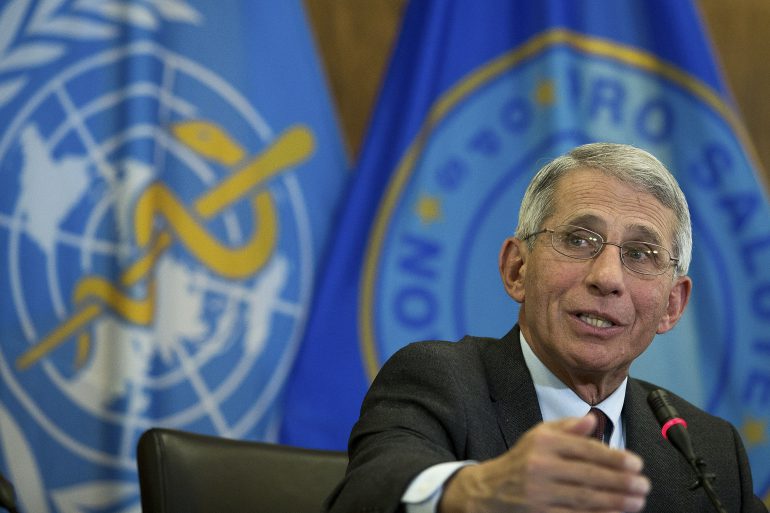Every day there are headlines about the Zika virus.
The number of travel-related cases is growing, and public health officials — especially in states such as Florida, which could be among the hardest hit — predict it is only a matter of time until the first locally transmitted case is confirmed. They are scrambling to prepare strategies to combat Zika’s spread. On the research front, at least one private pharmaceutical company is slated to begin human trials on a Zika vaccine in the fall, and National Institutes of Health researchers hope to bring their version to clinical trials as soon as summer’s end. But on Capitol Hill, efforts to approve emergency funding to support all of these initiatives are being held up by partisan disputes.
At the center is Dr. Anthony Fauci, director of the National Institute of Allergy and Infectious Diseases. He oversees federal Zika vaccine research and development activities and has been the leading government spokesman on the overall anti-Zika effort. It’s also been his job to find resources within NIH to support vaccine development while fighting for Congress to provide the additional funding. If it doesn’t happen soon, he warns, the progress made so far will stall. And, in the interim, he has been applying the lessons learned from the past outbreaks with which he has dealt — illnesses such as the West Nile virus and Ebola. “Outbreaks occur,” he said. “And if you find out you’re behind it as opposed to ahead of it, things are worse than they could’ve been.”
Fauci recently spoke with Kaiser Health News’ Carmen Heredia Rodriguez about the safety considerations that go into developing a vaccine and the ongoing funding fight. The conversation was edited for space and clarity.
Where do the resources to support federal vaccine research efforts come from — especially without congressional action to provide emergency funding?
In the early stages, we just diverted people, money, resources, activity away from the standard things that we were doing to start working on a Zika vaccine. We said, okay, we’re going to be asking for new resources. But, let’s get started on a full-blown, multi-component vaccine program. I mean not just one vaccine, but a series of four or five vaccines that are in various stages of development. And we did that.
Then it became very clear, very quickly, that in order to really mount this effort including vaccine [and] other things, we would need additional resources. That was when President Barack Obama asked us, together with the Centers for Disease Control and Prevention and the U.S. Agency for International Development, to put together what we would need. The president added it all up and it came to the $1.9 billion that he asked [Congress] for — of which ultimately, over a two-year period — $277 million would have been for NIH.
Then, when it became clear that we were not going to get that money expeditiously because of the back and forth between the Senate and the House and the administration, we needed some money pretty quickly. I started taking funds from malaria, from universal flu, from tuberculosis [programs]. And this is what people need to understand — it’s not that we were slowing down [that] work. The money that we were spending in February, March, April and May [on Zika] was money that we would be spending in July and August [on the other research]. We were borrowing money. We were mortgaging our resources.
So, that’s when the administration said, okay. In lieu of getting our appropriations and emergency supplement, we’re going to use some of the Ebola money that had not be spent by USAID and by the CDC. … That is what we are spending now.
Very soon — and when I say soon, I’m talking July, August — we’re going to run out of that money. And then, the effort that we’ve mounted on a vaccine and all other things, will come to a very, very — I wouldn’t say screeching halt — but, it would slow down.
What about testing the vaccine and conducting trials? Does the fact that pregnant women are likely the most vulnerable population complicate this part of the process?
Well, I think there’s a misunderstanding. It is likely — even though people don’t seem to understand that — that you would not be vaccinating pregnant women. You would be vaccinating women of child-bearing age. Because, once women are pregnant, the most vulnerable period is in the first trimester. Most women in those countries [Latin American countries which have already experienced outbreaks of Zika] don’t even know that they’re pregnant until they’re well into their first trimester. So, the horse is already out of the barn. That doesn’t mean that we won’t ever be vaccinating pregnant women. But the fundamental target is women of child-bearing age before they’re pregnant to protect them during pregnancy.
The Zika virus has been linked to Guillain–Barré syndrome in adults and deemed to cause microcephaly. What are the implications of these links for vaccine development?
You know, vaccine development is a very difficult issue because of the fact that you’re going to be vaccinating normal people. Before you do anything else, you have to make sure it’s safe. Guillain-Barré is associated with the disease. … Is that a risk? Yes. Is it a big risk? No, very likely a small risk.
But, that’s the reason why when you do vaccine trials, you’ve got to do a well-controlled trial that pays attention to safety.
Has work done on other viruses given researchers a leg up on finding a vaccine?
More than a leg up. Many of the things that we’re doing now are derivatives of things we had done with other vaccines. The leading candidate from the Vaccine Research Center [here at the National Institutes of Health] is one that will go into Phase I clinical trials likely in the beginning of September, or the end of August. It was [derived from] the same class of a vaccine that we [worked on] for West Nile several years ago. The live, attenuated vaccine that we’ll be testing in Brazil, in Colombia and likely in other areas in Central and South America and the Caribbean, is a vaccine that’s exactly the same broad class of a vaccine that we [work with] for dengue. So, already, work with West Nile and work with dengue has given us a very important head start on our vaccine work with Zika.
Are there lessons that can be learned from the recent Ebola experience that can be applied to this outbreak?
You know, there are so many lessons. One is that outbreaks occur. And if you find out you’re behind it as opposed to ahead of it, things are worse than they could’ve been.
Now, [an] Ebola outbreak is very different than a Zika outbreak because it’s a totally different disease. You have a vector instead of person-to-person contact. … It’s a mosquito-borne disease. Even though there’s some sexual transmission, the overwhelmingly major way of transmission is by mosquitoes. So, there are certain public health issues that are important and mosquito control that are different than the kind of ways you prevent the spread of Ebola. So, although they are very, very different, the common denominator is that if you are dealing with an emerging outbreak, in order to get control over it, you have to have the resources to act quickly and not wait around for them.








